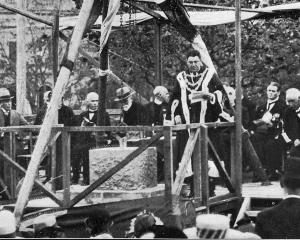Divorces were the order of the day in the Supreme Court in Auckland on Thursday last (says the Herald) and Mr Justice Herdman accomplished some fast work in dealing with the petitions before him. During the five hours he was on the bench he heard 44 matrimonial disputes, in 36 of which the petitioners were successful, the remainder being adjourned for various reasons. Divorces predominated, no fewer than 34 being granted. In the morning for three hours divorces were granted at the rate of approximately one every eight minutes, while for two hours in the afternoon the rate quickened to one every six minutes.

Wellington, December 21: Reference was made in the House today to the public disclosure of the contents of a telegram which was being forwarded from Napier by a South African newspaper correspondent during the visit of the Springboks to this country. The contents of the message found their way into the newspapers of New Zealand, and created something of a sensation at the time. "It is rumoured," Mr G. Witty said in the House of Representatives, "that underhand methods were used to get the information. Would the Postmaster-general make public the papers he has received dealing with the matter?"
The Postmaster-general (Hon J. G. Coates) said that he could not make any promise at the moment. To some extent the matter was sub judice. When the facts were all before him he would be pleased to consider the suggestion made by the member for Riccarton.
Media’s judgement noted
A compliment to the good judgement of the press was paid by Mr Justice Hosking at the Supreme Court at Wellington last week, when a question arose as to the advisability of withholding from newspaper report the name of a third party against whom insinuations had been made by the respondent in a divorce action. On Wednesday afternoon the lady’s name was freely used by respondent, and on Thursday she appeared in court voluntarily to deny on oath the suggestions made. Under the libel law her name might quite properly have been mentioned in a fair and accurate report, and counsel, realising the rights of the press in the matter, applied to the Bench for an order directing that the name should not be made public. The press, said Mr Justice Hosking in reply, knew its business much better than he did, and it was not for him to give a direction. However, no question of public morals was at issue, and it would be a graceful act to withhold the name. Members of the press had shown wise judgement on many occasions in the past, and might be trusted to act with good judgement in future. — ODT, 22.12.1921.












